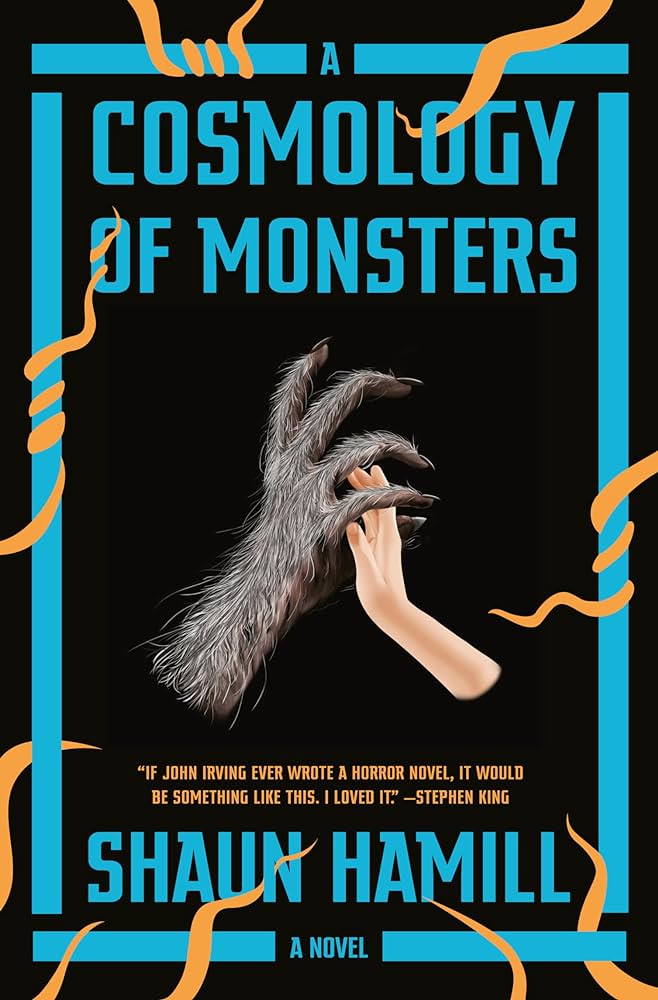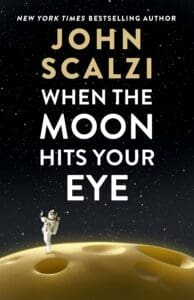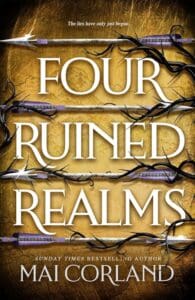
Synopsis
Noah Turner sees monsters.
His father saw them—and built a shrine to them with The Wandering Dark, an immersive horror experience that the whole family operates.
His practical mother has caught glimpses of terrors but refuses to believe—too focused on keeping the family from falling apart.
And his eldest sister, the dramatic and vulnerable Sydney, won’t admit to seeing anything but the beckoning glow of the spotlight . . . until it swallows her up.
Noah Turner sees monsters. But, unlike his family, Noah chooses to let them in .
Review
“I love you until the end of time, and whatever comes after that.”
Constructed upon the basis of such an emotion, Shaun Hamill’s A Cosmology of Monsters is nothing short of a love story. A deeply weird, strange, and at times horrific love story that at times had me scratching my head but on the whole pierced my heart deeply. Through memories of his past and even events that transpire before his arrival into this world, Noah Turner recounts how his family wound up the way they did. There’s one special thing about Noah that sets him apart from others, his ability to see monsters.
The formatting and structure of this novel reminded me deeply of Mike Flanagan’s The Haunting of Hill House limited series. Like the Crain family, the Turner family is haunted by certain ghosts of the past which I won’t get into here (spoilers). However, I can say the idea of deeper familial issues resonating among each member of the family is something that Hamill writes exceptionally well. Opening the novel with the story of Noah’s parents, Margaret and Harry, stole my heart and attention not unlike Harry’s deep admiration for horror fiction. We see them fall in love and start a family punctuated by the sentimental declarations of devotion as referenced by the quote I mentioned above. Hamill skillfully brings these characters to life in a way that touches your soul. How can you not root for their happiness?
Of course, this is a horror novel and things cannot stay romantic or endearing forever. Hamill examines such a thing in all of its ugly forms spanning from the struggles associated with grief, severe depression, sexual abuse, verbal abuse, and suicide (let this serve as a partial trigger warning list). This is a deeply dark story, make no mistake. As events of the novel progress, we’re exposed to the harsher realities of Noah’s upbringing, the moments of realistic horror and fantasy alike. Familial strife takes its toll on each member of the Turner family, yet it seems Noah is the only one who can see who is making that scratching noise on his window: a monster. Where the novel turns from here is a direction that I’m still not certain how to feel. Hamill takes a divisive turn with a character relationship, one I’m not sure how to discuss or comment on without spoiling things. It’s an influential piece of the central plot so I would be remiss to gloss over this, but what I can say is that I was so deeply invested at this point, there was no way I was putting this book down.
The latter half of the novel begs the question, “What does it mean to love a monster?” The answer to this question isn’t easy and a more important question is raised, “What makes a person a monster?” Of course, we aren’t given clear answers to that question either. Perhaps what’s greater than these questions is the type of love that permeates dimensional boundaries, spheres of reality, and the scars of trauma. The type of love Noah feels for his family in spite of all the hardship, heartache, and hurt they’ve experienced.
“..life makes monsters out of everyone, but it’s always possible to come back. Pain and death are real, but so are love, and family, and forgiveness.”
Shaun Hamill’s A Cosmology of Monsters, while traditionally categorized as a cosmic horror novel, is a character study of the heart built upon the strengths of love and redemption. This is a very weird story, one filled with bouts of the uncanny and strange occurrences alike. While some portions of Noah’s journey remain difficult for me to fully understand, the greater message reigns supreme and has proven to stick with me over the course of several weeks. Hamill peers into the darkest corners of loss, trauma, and familial strife only to utilize themes of forgiveness and sacrifice to shine a light of hope.









Leave a Reply